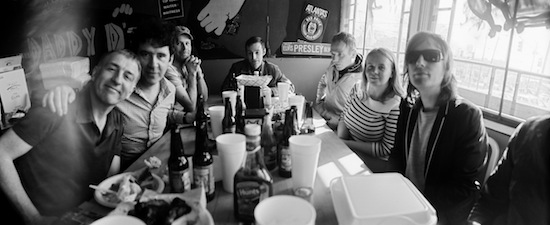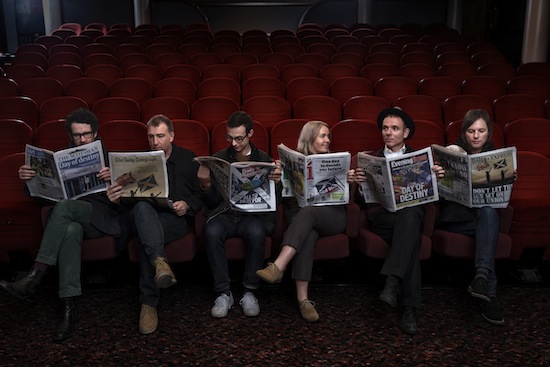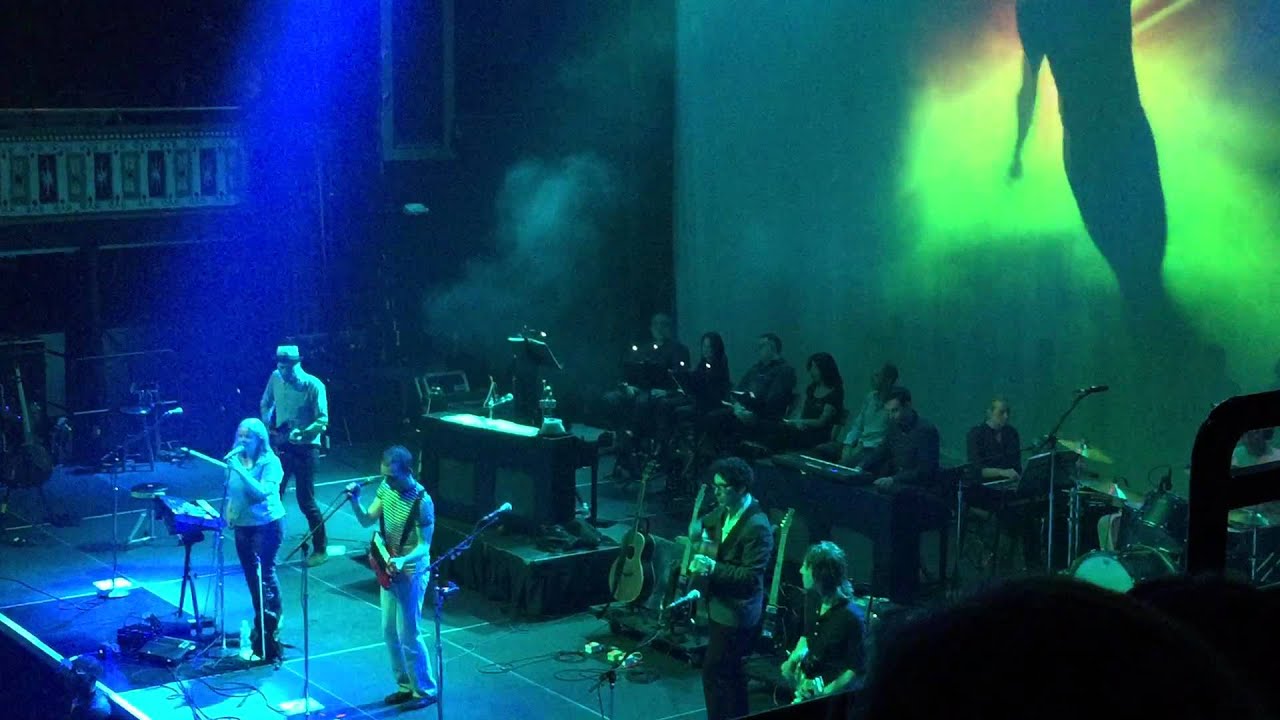Goodness, have Belle and Sebastian made a political album? That’s our first thought on seeing the shot of the band above. They’re holding the newspapers from the day of the Scottish independence referendum in case you’re squinting.
It’s not just an arch photo op, though. TQ has heard four freshly-mastered tracks from upcoming album Girls In Peacetime Want To Dance and we prick up our ears up at the opening line of new track ‘Allie’ – "when there’s bombs in the Middle East, you want to hurt yourself" – while ‘Cat With The Cream’ observes "everybody bet on the boom and got busted". Their last studio release, which was all the way back in 2010, was, to give it its full title, Belle And Sebastian Write About Love – is GIPWTD really Belle and Sebastian Write About Politics?
"I’d say no," says group’s frontman Stuart Murdoch, on the phone from Orlando, Florida. "Because somebody trying to make a political record is somebody making a boring record. It’s what people do when they’ve given up on life and romance. But I think I have become more aware of the outside world – you start looking around you a bit more when you’re older. I was interested in similar characters, but perhaps considering how the political world affects them."
Where did that title come from?
"It’s one which has been hanging around," he says. "I write down song titles and album titles every day of my life and I have been doing since 1996. I remember having the title for ‘Stars Of Track And Field’ for years before it actually became a song. But this title definitely paints a little picture for you."
"I actually got the idea for the record sleeve independently, but thought the title would work well together with it. It shows a girl who’s robot from the waist down and a guy who’s robot from the waist up, in a sort of post-war late-’40s scenario. The suggestion is that they’d been injured in some way during the war – but the robotics in question are far in advance of the actual period, a dreamlike scenario."
Lyrically, it’s a lush piano-led gospel-drenched ballad called ‘Nobody’s Empire’ which is most intriguing. We tentatively ask if the song is about Murdoch’s long-lasting struggle with Chronic Fatigue Syndrome ("I clung to the bed and I clung to the past," goes one line). Beginning in the late ’80s, it’s an experience he’s previously credited with his first ventures into songwriting.
"That’s precisely right," he says. "It’s a strange thing, because I’ve written songs in the past that have alluded to that period – basically I’ve used that stuff and leant on it and it’s been cathartic. But I don’t think I just ever simply sat there and wrote a song which actually describes what happened. And it surprised me that I did that. It was basically off the back of the film, which uses those elements as well."

The 46-year-old speaks with animation about the process of making movie God Help The Girl, which he wrote and directed and arrived in cinemas in August – but that’s not to say it didn’t take its toll.
"I’ve been struggling in the last year and the stress of overwork has actually put my health back quite a bit," he admits. "It was a particularly busy time in my life. I got a virus in Spain; it took me almost a year to get over that and get my strength back. It was a mentally trying time: I was back in ME land again and, almost to comfort myself, I wrote about the first time I was really sick. I’ve never encapsulated it like that before. Every word of ‘Nobody’s Empire’ means something to me, and it’s something real, not just made up. Although it’s couched in a metaphor, that song is absolutely the most personal I’ve ever written."
We wonder how differently things might have turned out if he hadn’t fallen ill.
"That time is so fundamental to everything that happened in my life, it’s impossible to imagine," he says. "I was obviously meant to have that crash, this series of unfortunate events brought me to that place. When I look back on it now, it’s like a story of redemption, like one of these corny films, except my story went on for seven years, and everything happened really, really slowly."
The technical process of completing the album wasn’t exactly stress-free – particularly for someone who is "strong-willed" in the studio (his words), as the opening of the album trailer above suggests. Murdoch recently tweeted: "Mastering an album is to certain men what childbirth is to women. I’m afraid I’m one of those men." He laughs at hearing this read back to him, but admits the process "adds up to everything that’s tense and awkward".
"I think it’s finishing something, just actually letting go of it and realising there’s no way back. It’s like landing a jet on an aircraft carrier – you can only get it wrong. Am I making any sense? It’s a tricky technical process."
Does he obsess about track order and the like?
"Of course you try not to obsess – you try to ignore it and hope the album tracklist will just come together," he says. "Songs are un-deliberate things – you write a song and it should just fall out. But the act of putting an album together in order is a deliberate process, one that you can take the blame for and one which you can fail in. It’s like editing a film, in a sense: you want it to be a story, to occupy people, for the dynamic to be right, for people to be along for the ride."
Of the new tracks, ‘Party Line’ is the musical eye-opener. The first 15 seconds in particular will perhaps cause a few double takes, fading in with that muted big beat effect that sounds like you’re queuing outside a club leaking music, getting closer until, boom, the door suddenly opens. Fifteen seconds more and it’s hard not to wonder if Belle and Sebastian have been listening to a lot of ‘Get Lucky’ over the last few years. Although, who hasn’t, frankly – we are all Pharrellites now, to paraphrase Peter Mandelson.
Guitarist Bobby Kildea was behind the music on this one, says Murdoch. "That sound was completely mapped out by Bob – every element you hear instrumentally. Then Ben Allen, our producer, came in and realised the whole thing on record."
The decision to work with Allen saw the band decamp to Maze Studios in Atlanta, Georgia for six weeks or so, which incidentally led to a collaboration with Dee Dee Penny from The Dum Dum Girls on a track called ‘Play For Today’ (an old friend of Murdoch’s, she happened to be passing through the city during recording). But the appointment of Allen, a former hip hop engineer who co-produced Animal Collective’s celebrated Merriweather Post Pavilion and who has worked closely with Cee-Lo Green among others, is perhaps confirmation (unnecessary, really, by now) that the interview-shy camera-shirking flute-soloing 500-copies-on-vinyl not-that-great-live Belles of old – though much beloved – bear very little resemblance to their current incarnation.
"We’ve never made a record with this kind of sound before," says drummer Richard Colburn, who, when we ask about his recent listening habits, enthusiastically talks of "re-evaluating" the Detroit techno scene and namechecks Derrick May, Rhythim is Rhythim, Juan Atkins and Blake Baxter.
"On the last few albums we’d put in six months of work to get everything really, really tight, so when we go into the studio, there’s not really any room for manoeuvre as far as arrangements go – it’s just a matter of playing the songs right. This time, with ‘Party Line’ and some of the others, we kept them a bit open-ended, so Ben would have a bigger influence on them. We purposefully left space for him to come in and have a say."
Did that make recording more fun?
"I actually really enjoyed it," he says. "It was a very different experience: little short bursts of energy, whereas before we’ve used most of the day to set up sounds. Ben was slightly different in that we’d come in at 11am or so and he’d have these sounds worked out. I’d sit down at the drum kit and we’d do two or three takes over the song and he’d be like: ‘Right, I’ve got everything I need.’ You’d be kinda like, ‘Erm, should we not play it 15, 20 times?’ ‘No, I’ve got everything.’ It was quite refreshing."
We ask if Colburn has a favourite track; he mentions ‘Enter Sylvia Plath’, which the band have played live a few times in the US. "It’s quite Europop," he laughs. "Just to warn you!"
About two days later it occurs to us that he was probably joking. Two days after that, we realise he wasn’t at all. A phone-filmed YouTube performance – which was probably massively annoying if you were sitting in the row behind at the gig and is quite the opposite if you weren’t – reveals Murdoch donning a keytar for an entertaining six and a half minutes of shimmering minor-key disco that at times sounds not unlike The Communards’ version of ‘Don’t Leave Me This Way’. Introducing the song, Murdoch tells the crowd: "They said to us, they said, Belle and Sebastian, you should write a disco number about Sylvia Plath… so we did."
Well, why not? It’s a Yes vote from us.
Girls In Peacetime Want To Dance is out on January 19, 2015 on Matador Records (January 20 in North America). Belle and Sebastian play Manchester on October 28, Bexhill-On-Sea on October 29 and the Pitchfork Festival in Paris on October 31




